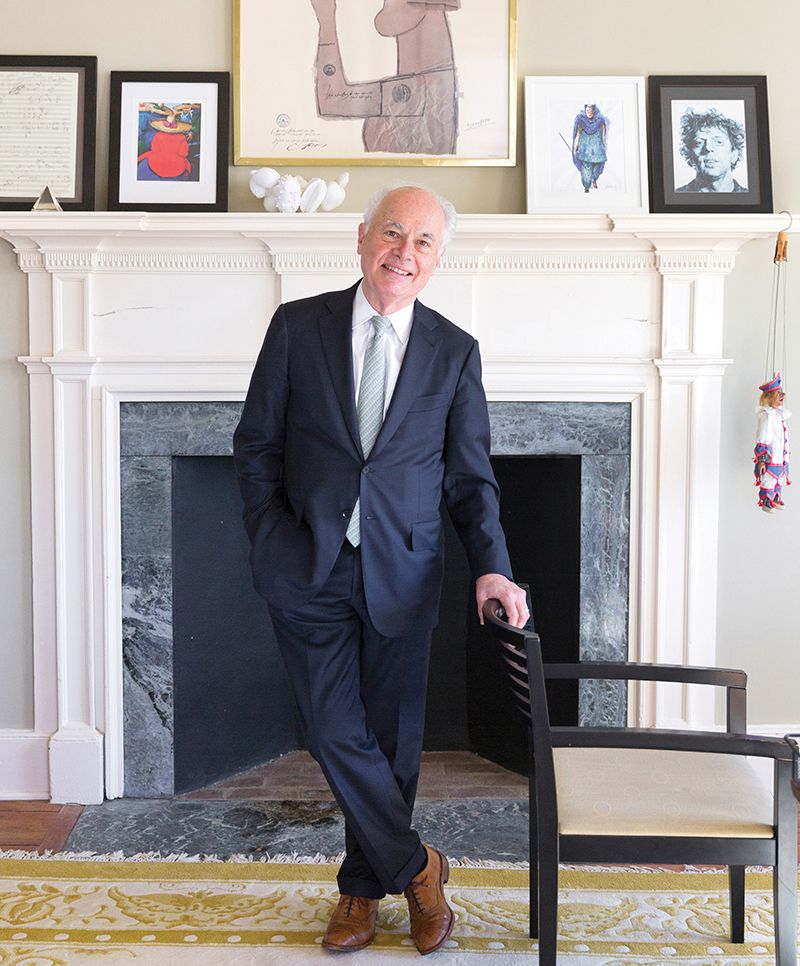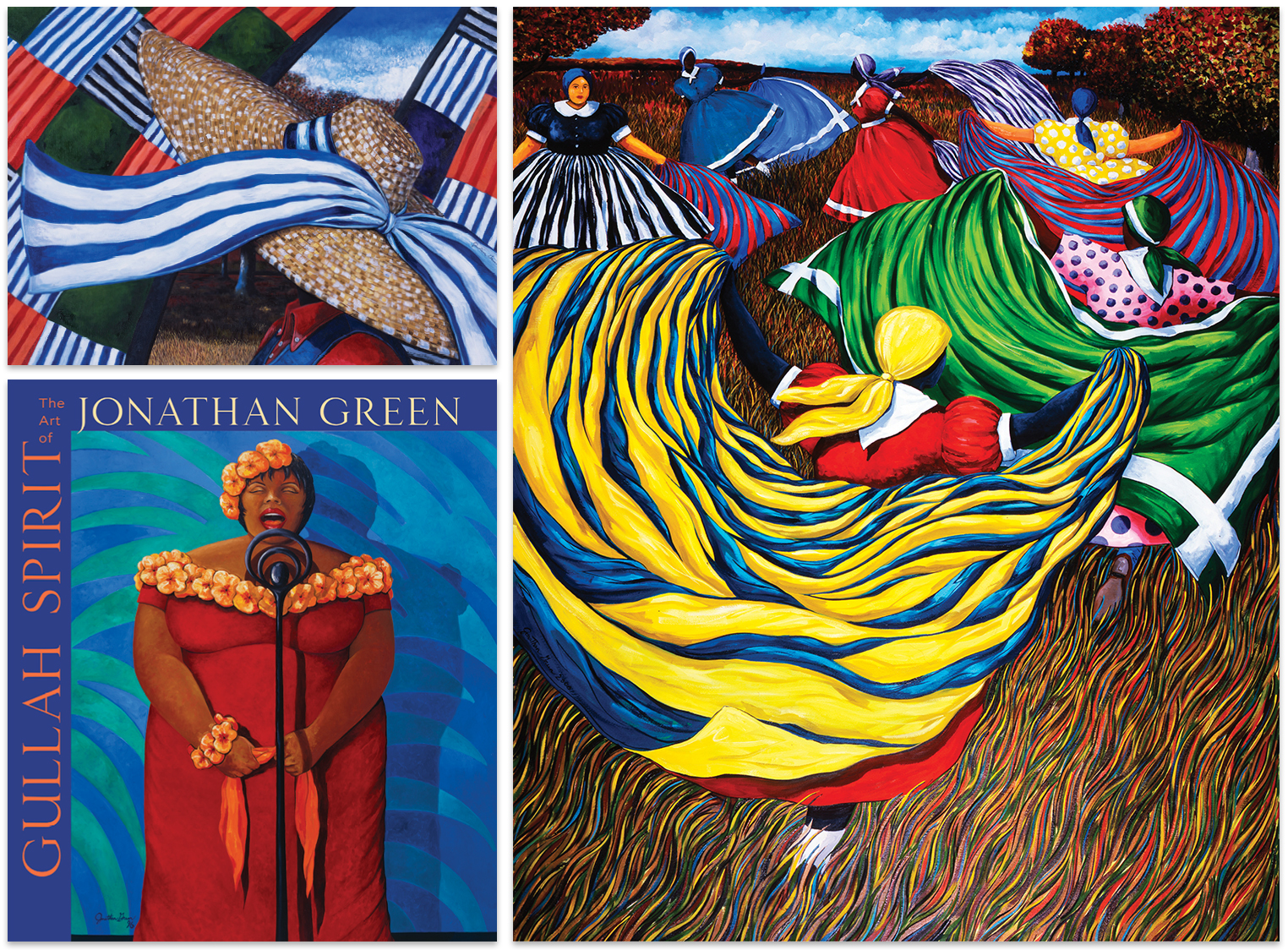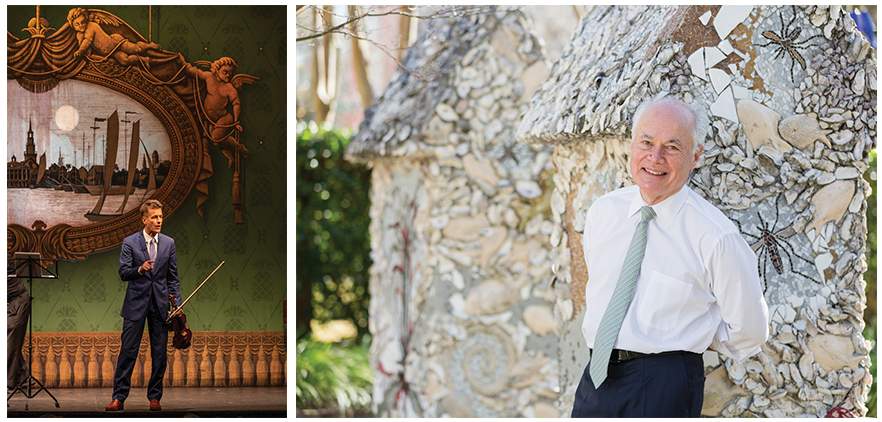Learn about the impact he’s made on the arts in Charleston, and around the world

Trees towered inside a hollowed-out Memminger Auditorium. Some of the world’s foremost sopranos and tenors splashed through a pond in the center of that dilapidated, cavernous space. Audience members fringed the periphery, and the chorus was scattered about, often out of the sight line of conductor Emmanuel Villaume, while a villainous Don Giovanni, sung by Nmon Ford, marauded through the lead role of what may be classic opera’s most standard fare. But there was nothing standard about director Günter Krämer’s Don Giovanni, the centerpiece production of Spoleto Festival USA’s 2005 season.
“It was one of the most memorable performances I’ve seen,” says Bill Medich, a Spoleto regular since the mid-1990s, a Spoleto Festival USA board member of 18 years, and current board chair. “This interpretation encapsulated for me what makes the festival so unique—this vision to take a broken-down auditorium and transform it into something magical, something powerful.” That intrepid boldness, the pioneering artistic spirit behind such a vision, is signature Nigel Redden.
This season marks the festival’s 45th year, and Redden’s last as general director, a post he has held since 1995, in addition to serving as general manager from 1986 to 1991. Throughout his tenure, Redden has been the driving force behind such daring productions. He’s also the impresario of a hydra that’s hard to fathom. Among other “duties as required,” Redden oversees programming for 17 days of nearly nonstop, cross-genre performances; coordinating artists from around the globe (and yes, also The Globe); fundraising to the tune of $4 million each year; administering a $7 million budget; reporting to a 48-person board of directors; attending performances and cocktail parties and galas—all without wrinkling his impeccably tailored suits. He was also a pivotal player in renovating the aforementioned once-crumbling Memminger into the marquee Festival Hall (ditto the Dock Street Theatre, the Gaillard, and the Sottile Theater, as well as the festival’s stately headquarters at 14 George Street).
Oh, and yes, that’s his voice you hear rising, Oz-like, before the curtain rises for every Spoleto performance—that pseudo-Bridgerton, slightly Euro-lilted accent that conveys erudite sophistication while welcoming you to the festival, and ever so politely, reminding you please, for the love of God, to silence your cell phones.
As vast as Redden’s role is, one might assume the job would be well suited to someone who plays it safe, who considers crossing the endless t’s and dotting the umpteen i’s that ensure the shows go on as plenty sufficient. But not Redden. To be sure, those i’s and t’s get duly dotted and crossed, but he’s also a risk taker, an Elon Musk of the arts, for whom Don Giovanni has hardly been the only boundary-pushing Spoleto production.
There were 18-plus hours of Chinese Kunqu opera involving 160 characters and more than 600 hand-embroidered costumes, plus ducks swimming in yet another pond, for the 2004 season’s The Peony Pavilion. In 2015, Jennifer Wen Ma, famed designer of the Beijing Olympics, premiered her dystopian Paradise Interrupted against an ethereal backdrop of laser-cut paper and digital imagery. And that’s just a few Spoleto-produced opera examples; we haven’t even mentioned the festival’s often cutting-edge modern dance, ballet, theater, music of all stripes, circus, puppetry—each offering, each season’s diverse programming, reflecting Redden’s desire to delight and challenge audiences. To present, as he says, “a broad range of the arts creating a catalytic effect, with every year bringing a different kind of excitement.”

Redden’s desire has been that the backdrop of Charleston would “inspire and shape the festival” but during his tenure, the opposite has also been true. Redden has left an indelible mark on the city’s arts landscape, including completely renovating a formerly dilapidated Memminger Auditorium (its lobby pictured inset) into a gleaming, versatile Festival Hall (here shown before opening in 2008).
Amid the Ruins
You could say that Nigel Redden’s journey to becoming an internationally celebrated arts champion began, as many journeys do, on foot, or rather perhaps, with a foot—specifically a 2,500-year-old Etruscan foot. “I still have it,” he says of the clay casting once tossed aside by the British Academy during excavations of Etruscan ruins outside of Rome, where Redden attended boarding school from age 12 through high school. “I was fascinated by Rome, still am,” says the son of worldly, well-traveled parents, his father an American diplomat and his mother from New Zealand. Born in Cyprus, Redden, along with his older brother and parents, lived in Israel, Toronto, England, and Washington, DC, before moving to Naples (when he went to school in Rome). “It’s a city of memory, much like Charleston. A wonderful palimpsest of time laid across time laid across time.”
Those early experiences exploring Roman ruins and old tombs tucked into valley walls overgrown by vegetation were formative for a well-read young chap with boundless curiosity. Redden recalls wandering across a medieval bridge “that D.H. Lawrence had described as a bubble rising across the river” and visiting Neapolitan grottos mentioned in the Aeneid, sparking his enduring love of history and culture. He saw his first opera as a young boy in Naples. Italians, he notes, encouraged young people to attend opera, “so a group of high school friends and I got a box. They were incredibly interesting productions—I heard Wagner in Italian. They were wonderful lessons in what opera could be.”
Lessons, it turns out, that have fueled Redden’s lifelong curriculum in what art, and an arts festival, can be, and lessons reinforced early on by a high school trip to Assisi and nearby Spoleto, Italy. “I walked around this ancient, neglected town, by myself, and encountered the remnants of a contemporary sculpture exhibit called ‘Sculptures in the City.’ It left a deep impression on me. I was intrigued by how something so contemporary could be overlaid onto a city thousands of years old,” he says of the exhibition that had been part of Gian Carlo Menotti’s Festival Dei Due Mondi, where Redden returned to apprentice after his freshman year in college.
Redden studied art history at Yale, where he also kept up his Italian. Through the Italian department, he was tapped for a summer job as an interpreter back at the Festival Dei Due Mondi. “One of the perks was that I got to attend performances for free. And I did,” he says. Merce Cunningham, John Cage, Ezra Pound, and Willem de Kooning were among the luminaries he met there. “Those summers opened my eyes to what I could do with my life,” says Redden, whose career has been infused with and driven by the arts ever since.
Before joining forces with Menotti again, this time at the Spoleto Festival USA in 1986, Redden worked at the Brooklyn Academy of Music and Walker Art Center, then later headed the dance program for the National Endowment of the Arts and served as executive director of the Santa Fe Opera. His wife of 35 years, Arlene Shuler, a former dancer with the Joffrey Ballet who went on to get her law degree, has similarly devoted her career to the arts, currently serving as president and CEO of New York City Center.

Redden (above, right) with Spoleto Festival USA founder Gian Carlo Menotti (center) in 1986; Redden first met Menotti at the Festival Dei Due Mondi in Spoleto, Italy (above), in 1969.
A Sixth Sense
Redden’s Spoleto tenure hasn’t all been exquisite arabesques and riveting arias. He left his initial role as general manager in 1991 due to artistic differences with founder Menotti. Redden returned in 1995, following Menotti’s resignation, to find a festival on the brink, with more than half the staff laid off and the program expenses over budget by more than 20 percent on top of a $1.2 million debt. Within a year, Redden had cut the debt in half. Astute fund-raising and financial stewardship has been a hallmark of his management ever since, helping steer the festival through the recession of 2008-2009 and the unprecedented cancelation of the entire 2020 program, due to the pandemic.
“Nigel is 100 percent about the art and artists. He lights up when talking about some esoteric opera or experimental theater company, and his enthusiasm inspires others to get excited, even if we don’t have any idea what he’s talking about,” says Bill Medich. “Yet he’s also grounded. He stepped into a financial disaster in the 1990s, but thanks to 25 years of financial prudence, we are on very solid footing. Nigel has a sixth sense about how hard he can push and be artistically ambitious without jeopardizing the festival’s financial well-being.” Or, as Redden puts it, “You don’t have to bet the farm.”
For violinist Geoff Nutall, artistic director for the Spoleto’s centerpiece Chamber Music program, Redden’s support has been tangible, and clearly visible. “At the beginning of every concert, I walk out on the Dock Street stage, look out at the audience, and there’s Nigel, impeccably dressed, standing, always standing, right in my line of vision at the back of the theater. Early on I thought, ‘Oh no, the boss is here, what if I goof?’ But I’ve come to realize he comes to every concert not because he has to, but because he wants to.” Nutall laughs when recounting Redden’s routine of pulling up to the Dock Street in a 1971 Rolls Royce (borrowed from his Charleston host). “It’s so Nigel. He has this aura, as if he’s an English country gentleman with his 1,000-acre estate, but then he starts talking about the weird modern opera he’s putting on. He’s this nice mix of the aristocrat and down-and-dirty, quirky artist guy. And I don’t even pretend to understand how he managed to save the festival, to raise all that money. I just know he’s been super supportive of me and other artists.”
“He allows an artist to do what artists do,” adds Jonathan Green, the Charleston-based artist and SC Ambassador for the Arts, whom Redden tapped to create the artistic vision and design for the festival’s 2016 production of Porgy and Bess. “When I told him I would love to do Porgy on the one condition that I’d have full artistic control, his answer was, ‘Well, of course.’ The only thing Nigel’s a stickler for is quality.”
When Green proposed a large Philip Simmon’s gate for the opening scene, Redden thought even bigger and came up with the funding for a gate that covered the entire stage. “Who does that?” Green asks. When Green introduced African-inspired diamond symbols into the set design, Redden suggested decorating the whole city. “He graciously allowed me to try to show people what America had suppressed—our Africanism. Breaking down that invisible barrier has been my greatest achievement as an artist,” affirms Green.
Closing the Curtain
Redden’s decision to retire at the end of 2021 comes after the wrenching disappointments of canceling last season and radically altering this one, the festival’s 45th, to ensure the health and safety of reduced capacity audiences. To be sure, he is not going out with a bang. But Redden, ever the believer in art’s power to challenge, enrapture, and transform, is proud of the state of the festival today, and enthusiastic for what lies ahead. Even after staging more than 4,500 performances during his Spoleto tenure, he’s not fatigued. “I’m still curious about what the arts will do. I’m not bored yet, there’s so much to be excited about,” he says. But in light of all we’ve collectively reflected on over the last year, including the desire to invite fresh, diverse voices into leadership roles, he feels ready to pass the maestro’s baton. “I’m excited about my ideas, but others have great ideas, too. It will be fascinating to see what someone else does with it,” he says. “It’s time.”
According to Medich, Redden is “running right through the tape. He’s not coasting into retirement by any stretch, but giving everything he’s always given to Spoleto. Perhaps even more, due to the challenges of planning a socially distanced festival.” This season will not be the same as the 44 seasons before, but then again, that is the essence of the festival, and an imprint of Redden’s innumerable contributions to it. “The overall feel of the festival has remained consistent to Menotti’s original framework—this idea that one should have a broad range of the arts that collide in a sort of catalytic effect. It’s a vision that renews itself from year to year,” Redden says.
“What I’ve wanted to do is to have the city of Charleston, this magical, historically complicated place, inspire the festival increasingly,” he adds. In this, he has robustly succeeded, as Medich and others shared. “Nigel’s outlook on beauty and excellence, his sophisticated taste and high standards for how things are presented, has infused the community as a whole,” Medich says. His mark is indelible. Just as the diamonds that Jonathan Green painted on significant African American landmarks around town in 2016 still linger, so too will Redden’s legacy.

Redden never misses a Dock Street Chamber Music concert, which used to unnerve the series director Geoff Nutall (above, left). “But then I realized he’s there not because he’s critiquing me or feels like he has to be, but because he wants to be,” says Nutall. Redden (above) pictured in the gardens outside Spoleto headquarters at 14 George Street. “The festival is a vision that renews itself from year to year,” he says.
Celebrating Nigel Redden’s Legacy
A Spoleto Gala Like No Other: Livestream Premiere
On Saturday, May 22, Spoleto Festival USA will celebrate 35 years of past festivals under the leadership and artistic vision of Nigel Redden. The Gala XLV retrospective journey, hosted by Grammy Award-nominee Anthony Roth Costanzo, will highlight the artists and performances that have shaped the festival (Laurie Anderson, Bill T. Jones, Ayodele Casel, Rhiannon Giddens, and many more) and honor Redden’s enduring impact on the performing arts community in Charleston and beyond. Donations made during the livestream will support the Nigel Redden Emerging Artist Fund, which has been created to continue his legacy of championing young artists for seasons to come. The livestream is free, but there are upgraded paid options as well. For tickets and information, visit spoletousa.org.